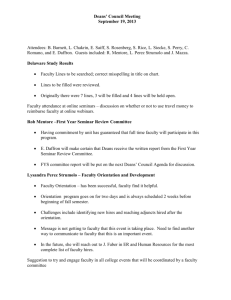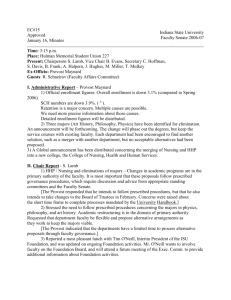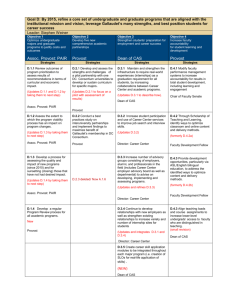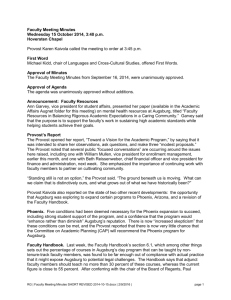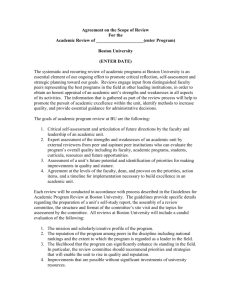INDIANA STATE UNIVERSITY Faculty Senate Executive Committee
advertisement
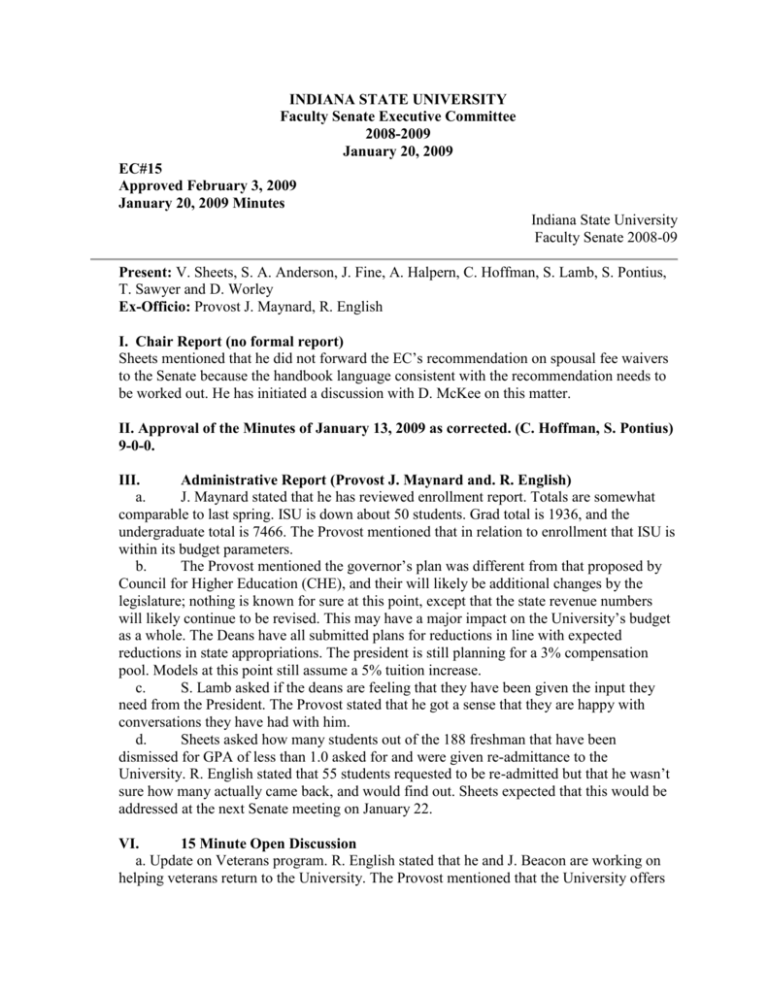
INDIANA STATE UNIVERSITY Faculty Senate Executive Committee 2008-2009 January 20, 2009 EC#15 Approved February 3, 2009 January 20, 2009 Minutes Indiana State University Faculty Senate 2008-09 Present: V. Sheets, S. A. Anderson, J. Fine, A. Halpern, C. Hoffman, S. Lamb, S. Pontius, T. Sawyer and D. Worley Ex-Officio: Provost J. Maynard, R. English I. Chair Report (no formal report) Sheets mentioned that he did not forward the EC’s recommendation on spousal fee waivers to the Senate because the handbook language consistent with the recommendation needs to be worked out. He has initiated a discussion with D. McKee on this matter. II. Approval of the Minutes of January 13, 2009 as corrected. (C. Hoffman, S. Pontius) 9-0-0. III. Administrative Report (Provost J. Maynard and. R. English) a. J. Maynard stated that he has reviewed enrollment report. Totals are somewhat comparable to last spring. ISU is down about 50 students. Grad total is 1936, and the undergraduate total is 7466. The Provost mentioned that in relation to enrollment that ISU is within its budget parameters. b. The Provost mentioned the governor’s plan was different from that proposed by Council for Higher Education (CHE), and their will likely be additional changes by the legislature; nothing is known for sure at this point, except that the state revenue numbers will likely continue to be revised. This may have a major impact on the University’s budget as a whole. The Deans have all submitted plans for reductions in line with expected reductions in state appropriations. The president is still planning for a 3% compensation pool. Models at this point still assume a 5% tuition increase. c. S. Lamb asked if the deans are feeling that they have been given the input they need from the President. The Provost stated that he got a sense that they are happy with conversations they have had with him. d. Sheets asked how many students out of the 188 freshman that have been dismissed for GPA of less than 1.0 asked for and were given re-admittance to the University. R. English stated that 55 students requested to be re-admitted but that he wasn’t sure how many actually came back, and would find out. Sheets expected that this would be addressed at the next Senate meeting on January 22. VI. 15 Minute Open Discussion a. Update on Veterans program. R. English stated that he and J. Beacon are working on helping veterans return to the University. The Provost mentioned that the University offers veterans free tuition for the first semester, short term loans and reasonable tuition. He also mentioned that the biggest problem with vets is the time it takes to process their paperwork. b. Update on Boys State. The Provost stated that he and J. Beacon are working on issues pertaining to Boys State. He mentioned that Boys State has been extremely hard to work with over the last few years and that ISU makes no money from the program. He also mentioned that, contrary to rumors, there have been no safety issues associated with it. Boys State has been a part of ISU for the last 39 years and the Provost stated that he is willing to continue to work with them to help resolve some of the issues. He mentioned one issue was that students have been placed in dorms with no air-conditioning. He also mentioned that no problems have been reported with Girls State. c. Moved into Executive session at 3:45 p.m. (re issues raised by Correctional Education Program (CEP) faculty – discussion.) Moved out of executive session at 3:47 p.m. d. Question related to Dean Sauer’s announcement in Arts & Sciences that faculty should expect to move to a 4 course teaching load. The Provost indicated that this was consistent with the handbook and that reduction to a 3-course load should come with an expectation of research. He is aware that some faculty may only teach 2 or 3 courses, and do little or no research. He also mentioned that people may need to adjust their schedules. He stated that next year may find us with a higher student demand but fewer faculty to teach courses. The Provost stated that if a faculty member taught 9 credit hours instead of 12 that the faculty member would need to justify his workload. Question was asked as to whether there would be reduction in grad assistantships and fellowships. The Provost stated that right now that area will be protected to avoid loosing students. e. The Provost mentioned that with the bulk of spending in many departments being in personnel, deans have to have the discretion to terminate staff and pre-tenure faculty contracts that don’t support institutional needs/directions. However, he stated that no one has proposed that yet. He also stated that student services and business affairs are in similar positions with virtually all of their budgets being in personnel. f. A question was asked how many faculty are considered for tenured this year. J. Maynard stated that there are around 25 (mid 20’s) hired in 2002 who will be considered for tenure this year. A question was also asked if there may be problematic issues terminating someone in last year of tenure as it pertains to the handbook. The Provost noted that any such terminations would require a year notice according to AAUP guidelines. S. Lamb mentioned that academic guidelines and professionalism should play an important part in dean’s decision to re-affirm positions. Open discussion among all parties should be the upmost importance. V. New Business a. Provost presented a Faculty Evaluation Process document as developed by taskforce in the fall, which was followed by discussion and comments. What is good about this process? 1. It is developmental. It requires each department to have a robust conversation with the faculty/staff regarding performance, to set-up expectations and goals for the next year (as well as to review achievements at the end of the year.) 2. It would provide a mechanism for deans, chairs, and personnel committees to forestall development of unproductive habits and document when they do. 3. Separates work and compensation by creating a flexible framework. 4. The board of trustees is requiring this and wants the University to have an effective evaluation system for all employees. 5. Mechanism can be both challenging and difficult but can be implemented by firm assistance and determination of deans and chairs. (e.g. deans can now say “they mean it”). 6. There is nothing more effective than social norms. Evaluations should not only be about money, but about assuring accountability to one’s peers. 7. It allows for flexibility in weighing faculty performances. Some people are more engaged in teaching, others in research, and that may vary across career. This structure would allow faculty to make such modifications as their careers change, while still enabling departments to plan for and achieve program-related goals/missions. Sheets will ask Linda Sperry and FAC to consider this document. b. Formal consideration of governance/committee recommendations from FAC. Motions were made to approve series of proposed constitutional amendments (D. Worley/S. Pontius) 9-0-0. These related to the size of senate, election to senate, speaking seats on senate, and voting-rights within college-level bodies. Motion to approve series of changes in bylaws (D. Worley/S. Pontius) 9-0-0. These relate to committee size/structure. Motion to approve series of University Committee recommendations. (D. Worley/S. Pontius) 9-0-0. These recommend changes in appointment/structure to all-university committees. Sheets reminded members that these would not be voted on at this week’s Senate. Constitutional amendments are read at Senate and voted on next time. Sheets suggested same pattern might be followed for these other structural changes. VI. a. b. c. d. e. f. g. h. Committee reports: AAC – meets tomorrow at 8:00 a.m. AEC – none CAAC – set up task force and look at issue of what constitutes a school. FAC – will meet tomorrow FEBC – meets tomorrow at 1:00 GC – met this morning SAC – no January meeting has been scheduled. URC – trying figure out when they are to meet. Meeting adjourned at 5:15 p.m.
